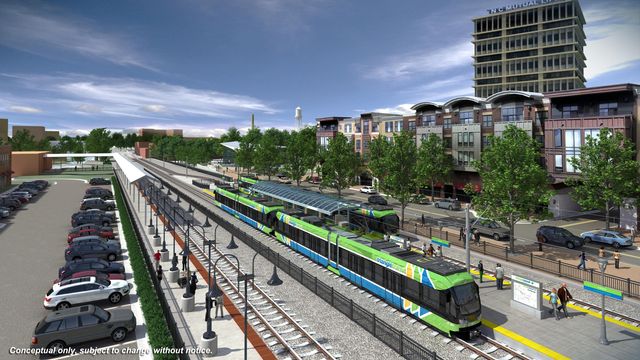Wake commissioners lukewarm on light rail
Regional transit officials are excited over federal approval on Tuesday to enter project development on a 17-mile light rail system in Durham and Orange counties, but Wake County commissioners remain light on the idea.
Posted — UpdatedThe light rail line would run from Chapel Hill to East Durham with proposed stops that include UNC Hospitals, the University of North Carolina at Chapel Hill, Duke University, Duke University Medical Center, VA Medical Center, downtown Durham and North Carolina Central University.
Project development is scheduled to take two years followed by a three-year engineering phase. Construction would begin afterward and could take 4 to 5 years before light rail service could begin.
The project cost is estimated at $1.34 billion, according to Triangle Transit. Voters in Durham and Orange counties approved a one-half cent sales tax to fund the local share of the project along with new and expanded bus service.
“I hope this will cause conversations to be a little more serious in Wake County,” said David King, Triangle Transit general manager.
Conflicting regional views
The Wake County Board of Commissioners has yet to take up a 2011 transit plan that includes commuter rail service between Durham and Garner and light rail service from downtown Cary to Triangle Town Center. Commissioners established a transit panel in September to examine the county’s transportation infrastructure and feasibility.
Wake County Board of Commissioners Chairman Joe Bryan wants a more measured approach to public transportation. He believes the county should focus more on education, human services and public safety.
“I could not personally support a plan like this in Durham and Orange County when you're counting on 75 percent of the money like a make believe unicorn that's gonna come from somewhere else,” he said. “It doesn't exist.
“Last time I checked, neither the federal government nor the state government has any money.”
North Carolina’s largest city wouldn’t have the system it has if elected officials had Bryan’s view, King countered.
“Had Charlotte taken that attitude, they wouldn’t have 9.5 miles of light rail,” he said. “Nor would they be doubling that line as we speak.
“So perhaps the unicorn is in the eye of the beholder.”
Durham commissioners approved a transit plan in 2011 that includes commuter rail between Durham and Wake counties and the light rail system. Durham voters approved the one-half cent sales tax that same year. Orange County voters approved the tax the following year.
Transit is slated for discussion during Wake commissioners’ scheduled retreat on Friday.
Ongoing effort
The idea of a passenger rail system in the Triangle has been visited in the past.
A regional rail plan was discussed in 1995, with the state signing a full-funding grant agreement with Triangle Transit in 2003 for the 35-mile plan, according to the Regional Transportation Alliance, a group founded by area chambers of commerce to represent businesses regarding transportation issues.
The plan was scaled down to 28 miles before Triangle Transit withdrew its federal funding request in 2006 due to the government’s low rating of the proposal.
Meanwhile, bus service has grown across the region with expanded and new express routes.
Part of the resistance behind bringing passenger rail service to the area is that the Triangle is spread out, said Harvey Schmitt, president and chief executive officer of the Greater Raleigh Chamber of Commerce.
Raleigh is the country’s 87th most congested market but is one of the top 10 fastest growing, Schmitt said.
“That has to make it harder to come up with a transit solution, and I think that’s one of the challenges we have to overcome,” he said. “But it is a challenge we must overcome if we’re going to move forward as a community.”
King believes it will be too late if Wake commissioners wait until anticipated ridership increases and vehicle congestion gets beyond control.
“Wayne Gretsky once said, ‘You don’t skate to where the puck is, you skate to where the puck is going to be,’” he said. “There’s a price for growth, and the price for growth is you have to prepare for it or it overwhelms you."
• Credits
Copyright 2024 by Capitol Broadcasting Company. All rights reserved. This material may not be published, broadcast, rewritten or redistributed.





